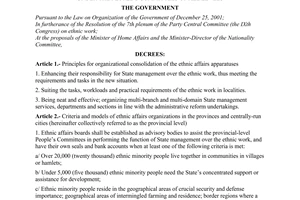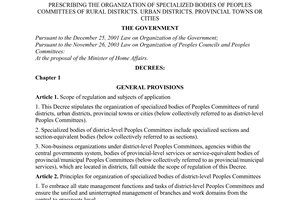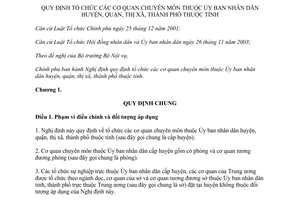Nội dung toàn văn Decree No. 37/2014/ND-CP organization of specialized agencies under people’s committees
|
THE GOVERNMENT |
THE SOCIALIST
REPUBLIC OF VIETNAM |
|
No. 37/2014/ND-CP |
Hanoi, May 5, 2014 |
DECREE
PROVIDING THE ORGANIZATION OF SPECIALIZED AGENCIES UNDER PEOPLE’S COMMITTEES OF DISTRICTS, TOWNS OR PROVINCIAL CITIES (*)
Pursuant to the December 25, 2001 Law on Organization of the Government;
Pursuant to the November 26, 2003 Law on Organization of People’s Councils and People s Committees;
At the proposal of the Minister of Home Affairs,
The Government promulgates the Decree providing the organization of specialized agencies under People s Committees of districts, towns or provincial cities.
Chapter I
GENERAL PROVISIONS
Article 1. Scope of regulation and subjects of application
1. This Decree provides the organization of specialized agencies under People’s Committees of districts, towns or provincial cities (below collectively referred to as district- level People’s Committees).
2. This Decree applies to specialized agencies under district-level People’s Committees, including divisions and divisional-level bodies (below collectively referred to as divisions).
3. This Decree does not apply to non-business organizations under district-level People’s Committees, subordinate central agencies, and agencies of departments and departmental- level agencies under provincial-level People’s Committees (below collectively referred to as departments) based in districts.
Article 2. Organization principles
1. Ensuring the full performance of state management functions and tasks of district- level People’s Committees and the uniformity and continuity in the management of sectors or working fields from central to grassroots level.
2. Organizing multi-sectoral and multi-field management divisions; ensuring streamlining, rationality and efficiency; it is not necessary to organize at the district level all organizations corresponding to the provincial level.
3. Ensuring suitability with each type of district-level administrative units and with natural conditions, population size and socio-economic conditions of each locality and satisfaction of state administrative reform requirements.
4. Ensuring no overlapping functions, tasks and powers with ministries’ or departments’ organizations based in districts.
Article 3. Position and functions
1. Specialized agencies under district-level People’s Committees shall perform the functions of advising and assisting district-level People’s Committees in the state management of sectors and fields in localities and a number of tasks and powers as authorized by district- level People’s Committees and as prescribed by law, ensuring uniform management of sectors or working fields in localities.
2. Specialized agencies under district-level People’s Committees shall submit to the direction and management of organization, working positions, payrolls of civil servants, structures of civil servant ranks and working activities by district-level People’s Committees and concurrently submit to the direction, examination and professional guidance by specialized agencies under provincial-level People’s Committees.
Article 4. Tasks and powers
1. To submit to district-level People’s Committees for promulgation decisions and directives; master plans as well as long-term, 5-year and annual plans; programs and measures to organize the performance of state administrative reform tasks assigned to them in the fields under their management.
2. To organize the implementation of legal documents, master plans and plans after they are approved; to publicize, disseminate and educate laws in the fields under their assigned management; and monitor the implementation of laws.
3. To assist district-level People’s Committees in, and take responsibility for, the appraisal, registration, and grant of licenses of all types within the scope of responsibilities and competence of specialized agencies in accordance with law and as assigned by district- level People’s Committees.
4. To assist district-level People’s Committees in performing the state management of collective and private economic organizations, and associations and non-governmental organizations operating in localities in the fields under the management of specialized agencies in accordance with law.
5. To provide professional guidance in the fields under their management for cadres and civil servants of communes, wards and townships (below collectively referred to as commune level).
6. To organize the application of scientific and technological advances; to develop information and storage systems serving state management work and professional tasks of district-level specialized agencies.
7. To periodically and extraordinarily inform and report on the performance of their assigned tasks according to regulations of district-level People’s Committees and line departments.
8. To examine organizations and individuals in implementing the provisions of law in the assigned sectors and fields; to settle complaints and denunciations; to prevent and fight corruption and waste in accordance with law and as assigned by district-level People’s Committees.
9. To manage organizational apparatuses, working positions, payrolls of civil servants, structures of civil servant ranks; to implement the salary regime as well as policies and regimes on preferential treatment, commendation, disciplining, and professional training and retraining of civil servants under their management in accordance with law and as assigned by district- level People’s Committees.
10. To manage, and take responsibility for, their finance in accordance with law and as assigned by district-level People’s Committees.
11. To perform other tasks as assigned by district-level People’ Committees or prescribed by law.
Article 5. Heads
1. The head of a specialized agency under the district-level People’s Committee (below referred to as the division’s head) shall take responsibility before the district-level People’s Committee and its chairperson and before law for the performance of the functions, tasks and powers of his/her division.
2. Deputy heads of a specialized agency under the district-level People’s Committee (below referred to as the division’s deputy heads) shall assist the division’s head in directing a number of working aspects and take responsibility before the division’s head for their assigned tasks. When the division’s head is absent, he/she shall authorize a deputy head to administer the division’s activities.
3. The number of deputy heads of a specialized agency under the district-level People’s Committee must not exceed 3.
4. The appointment, transfer, rotation, commendation, disciplining, relief from office, approval of resignation of, and implementation of regimes and policies toward, divisions’ heads and deputy heads shall be decided by chairpersons of district-level People’s Committees in accordance with law.
Article 6. Working regime and responsibilities of divisions’ heads
1. Specialized agencies under district-level People’s Committees shall work according to the single-boss regime and regulations of district-level People’s Committees, ensuring the principle of democratic centralism; and implement the information and reporting regime of specialized agencies under regulations.
2. Pursuant to law and as assigned by district-level People’s Committees, divisions’ heads shall elaborate working regulations and information and reporting regimes for their divisions and direct and examine the implementation of such regulations.
3. Divisions’ heads shall take responsibility before district-level People’s Committees and their chairpersons for the performance of functions, tasks and powers of their divisions and of the tasks assigned or authorized by district-level People’s Committees or their chairpersons. They shall practice thrift, combat waste and take responsibility for acts of corruption or waste causing damage in the organizations or units under their management.
4. Divisions’ heads shall report to district-level People’s Committees, chairpersons of district-level People’s Committees and line departments on the organization and operation of their divisions; present work reports upon request before district-level People’s Councils and People’s Committees, or before district-level People’s Committees of localities where People’s Councils are not organized on a pilot basis; coordinate with heads of district-level specialized agencies and socio-political organizations in settling matters related to their functions, tasks and powers.
Chapter II
ORGANIZATION OF SPECIALIZED AGENCIES UNDER DISTRICT-LEVEL PEOPLE’S COMMITTEES
Article 7. Specialized agencies organized uniformly in districts, towns and provincial cities
1. Home Affairs Divisions:
To advise and assist district-level People’s Committees in performing the state management of organizational apparatuses; working positions; payrolls of civil servants and structures of civil servant ranks in state administrative agencies and organizations; working positions and structures of public employees based on professional titles and numbers of employees in public non-business units; salaries of cadres, civil servants, public employees and contractual laborers in administrative agencies and organizations as well as public non-business units; administrative reform; local administrations; administrative boundaries; cadres, civil servants and public employees; commune-level cadres, civil servants and part-time officers; associations and non-governmental organizations; state archives work; religion; youth work; and emulation and commendation.
2. Justice Divisions:
To advise and assist district-level People’s Committees in performing the state management of law making and implementation, monitoring of law implementation, examination and handling of legal documents, control of administrative procedures, and law dissemination and education; grassroots conciliation, legal aid, child adoption, civil status, certification, state compensation and other judicial matters in accordance with law; and management of the implementation of the law on handling of administrative violations.
3. Finance-Planning Divisions:
To advise and assist district-level People’s Committees in performing the state management of finance; planning and investment; business registration; integrated and uniform management of matters related to enterprises, cooperatives and private economy.
4. Natural Resources and Environment Divisions:
To advise and assist district-level People’s Committees in performing the state management of land; water resources; minerals; environment; and sea and islands (for districts having sea and islands).
5. Labor, War Invalids and Social Affairs Divisions:
To advise and assist district-level People’s Committees in performing the state management of employment; vocational training; labor; salaries; wages; social insurance (compulsory social insurance, voluntary social insurance and unemployment insurance); occupational safety; people with meritorious service; social protection; child protection and care; gender equality; and prevention and combat of social evils.
6. Culture and Information Divisions:
To advise and assist district-level People’s Committees in performing the state management of culture; family; physical training and sports; tourism; advertising; post; telecommunications; information technology; radio and television broadcasting; press; publication; grassroots information; foreign service information; and information infrastructure.
7. Education and Training Divisions:
To advise and assist district-level People’s Committees in performing the state management of education and training programs and contents; criteria for teachers and education administrators; criteria for school physical foundations and equipment and children’s toys; regulations on exams and grant of diplomas and certificates; and assurance of the quality of education and training.
8. Health Divisions:
To advise and assist district-level People’s Committees in performing the state management of preventive medicine; medical examination and treatment and functional rehabilitation; traditional medicine and pharmacy; reproductive health; medical equipment; pharmacy; cosmetics; food safety; health insurance; and population and family planning.
9. Inspectorates:
To advise and assist district-level People’s Committees in performing the state management of inspection, and settlement of complaints and denunciations within the scope of state management of district-level People’s Committees; performance of tasks and powers related to inspection, settlement of complaints and denunciations, and corruption prevention and control in accordance with law.
10. Offices of People’s Councils and People’s Committees or Offices of People’s Committees of localities where People’s Councils are not organized on a pilot basis:
To advise People’s Councils and People’s Committees on the operation of People’s Councils and People’s Committees; to advise chairpersons of People’s Committees on their direction and administration work; to provide information serving the management by, and operation of, People’s Councils, People’s Committees and state agencies in localities; to ensure physical and technical foundations for the operation of People’s Councils and People’s Committees; to directly manage and direct the operation of one-stop shop sections in charge of receiving dossiers from and returning dossier-processing results to individuals and organizations; to guide and receive dossiers from individuals and organizations in all fields falling within the competence of district-level People’s Committees, transfer dossiers to specialized agencies under district-level People’s Committees for processing, and receive dossier-processing results for return to individuals and organizations.
For ethnic minority people-inhabited districts which do not fully satisfy the criteria for establishment of ethnic affairs divisions, the Offices of People’s Councils and People’s Committees or the Offices of People’s Committees, for localities where People’s Councils are not organized on a pilot basis, shall advise and assist their People’s Committees in performing the state management of ethnic affairs.
For district-level administrative units having national boundary borderlines on land, sea and islands, the Offices of People’s Councils and People’s Committees or Offices of People’s Committees, for localities where People’s Councils are not organized on a pilot basis, shall advise and assist their People’s Committees in performing the state management of foreign and border affairs.
Article 8. Specialized agencies organized to suit each type of district-level administrative units
In addition to the 10 specialized agencies organized uniformly in all districts, towns and provincial cities as prescribed in Article 7 of this Decree, a number of specialized agencies shall be organized to suit each type of district-level administrative units as follows:
1. In urban districts:
a/ Economic Divisions:
To advise and assist People’s Committees of urban districts in performing the state management of small and cottage industries; science and technology; industry; and trade;
b/ Urban Management Divisions:
To advise and assist People’s Committees of urban districts in performing the state management of construction and architecture planning; construction investment activities; urban development; technical infrastructure of urban centers, industrial parks, economic zones and hi-tech parks (including water supply and drainage in urban centers, industrial parks, economic zones, hi-tech parks and building materials production establishments; urban lighting and greeneries; management of cemeteries, except martyrs’ cemeteries; management of urban underground construction; and management of shared use of urban technical infrastructure); housing; public working offices; building materials; and transport.
2. In towns and provincial cities:
a/ Economic Divisions:
To advise and assist People’s Committees of towns or provincial cities in performing the state management of agriculture; forestry; salt production; irrigation; fisheries; rural development; natural disaster prevention and control; food quality and safety for agricultural, forest, fishery and salt products; small and cottage industries; science and technology; industry; and trade;
b/ Urban Management Divisions:
To advise and assist People’s Committees of towns or provincial cities in performing the state management of construction and architecture planning; construction investment; urban development; technical infrastructure of urban centers, industrial parks, economic zones and hi-tech parks (including water supply and drainage in urban centers, industrial parks, economic zones, hi-tech parks and building materials production establishments; urban lighting and greeneries; management of cemeteries, except martyrs’ cemeteries; management of urban underground construction; and management of shared use of urban technical infrastructure); housing; public working offices; building materials; and transport.
3. In rural districts:
a/ Agriculture and Rural Development Divisions:
To advise and assist People’s Committees of rural districts in performing- the state management of agriculture; forestry; salt production; irrigation; fisheries; rural development; natural disaster prevention and control; food quality and safety for agricultural, forest, fishery and salt products; development of household economy, rural farm economy, agricultural, forest, fishery and salt production cooperative economy in association with rural trades and rural craft villages;
b/ Economic and Infrastructure Divisions:
To advise and assist People’s Committees of rural districts in performing the state management of industry; small and cottage industry; trade; construction and architecture planning; construction investment activities; urban development; technical infrastructure of urban centers, industrial parks, economic zones and hi-tech parks (including water supply and drainage in urban centers, industrial parks, economic zones, hi-tech parks and building materials production establishments; urban lighting and greeneries; management of cemeteries, except martyrs’ cemeteries; management of urban underground construction; and management of shared use of urban technical infrastructure); housing; public working offices; building materials; transport; and science and technology.
4. Ethnic Affairs Divisions:
To advise and assist district-level People’s Committees in performing the state management of ethnic affairs.
Provincial-level People’s Committees shall submit the establishment of Ethnic Affairs Divisions to provincial-level People’s Councils for decision based on the criteria specified at Point a, Clause 3, Article 2 of the Government’s Decree No. 53/2004/ND-CP of February 18, 2004, on strengthening of ethnic affairs apparatuses under People’s Committees at all levels.
Article 9. Organization of specialized agencies on island districts
1. Based on the specific conditions of each island district, provincial-level People’s Committees shall submit to provincial-level People’s Councils for decision the numbers and names of specialized agencies under People’s Committees of island districts.
2. The number of specialized agencies under the People’s Committee of an island district must not exceed 10.
Chapter III
TASKS AND POWERS OF PROVINCIAL-LEVEL PEOPLE’S COMMITTEES AND DISTRICT-LEVEL PEOPLE’S COMMITTEES REGARDING THE ORGANIZATION OF DISTRICT LEVEL SPECIALIZED AGENCIES
Article 10. Provincial-level People’s Committees
1. To specifically guide the functions, tasks, powers and organization of specialized agencies under district-level People’s Committees in accordance with this Decree and other relevant legal documents.
2. To examine and inspect the organization of specialized agencies under district-level People’s Committees.
3. For localities with island districts, provincial-level People’s Committees shall submit to provincial-level People’s Councils for decision the organizational structures; and the establishment, merger or dissolution of specialized agencies of island districts.
Article 11. District-level People’s Committees
1. To specify tasks and powers of specialized agencies under district-level People’s Committees under the guidance of provincial-level People’s Committees.
2. People’s Committees of island districts shall submit to provincial-level People’s Committees schemes on establishment, merger or dissolution of specialized agencies of island districts.
Article 12. Chairpersons of district-level People’s Committees
1. To appoint heads and deputy heads of specialized agencies under district-level People’s Committees according to regulations (the appointment and relief from office of district-level chief inspectors must comply with the inspection law).
2. Biannually and annually, to report on the organization and operation of specialized agencies under district-level People’s Committees to district-level People’s Councils and provincial-level People’s Committees.
Chapter IV
IMPLEMENTATION PROVISIONS
Article 13. Effect
This Decree takes effect on June 20, 2014, and replaces the Government’s Decree No. 14/2008/ND-CP of February 4, 2008, providing the organization of specialized agencies under People’s Committees of districts, towns and provincial cities; and the Government’s Decree No. 12/2010/ND-CP of February 26, 2010, amending and supplementing a number of articles of the Government’s Decree No. 14/2008/ND-CP of February 4, 2008, providing the organization of specialized agencies under People’s Committees of districts, towns and provincial cities.
Article 14. Implementation responsibility
Ministers, heads of ministerial-level agencies, heads of government-attached agencies, chairpersons of provincial-level People’s Councils and chairpersons of provincial-level People’s Committees shall implement this Decree.-
|
|
ON BEHALF OF
THE GOVERNMENT |
(*) Công Báo Nos 497-498




